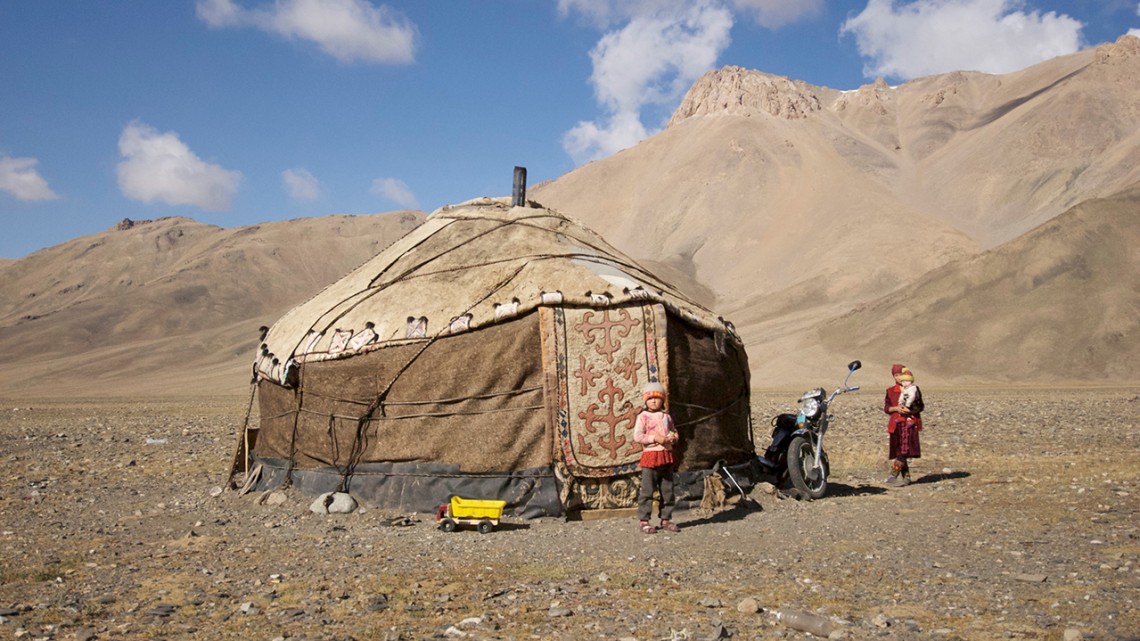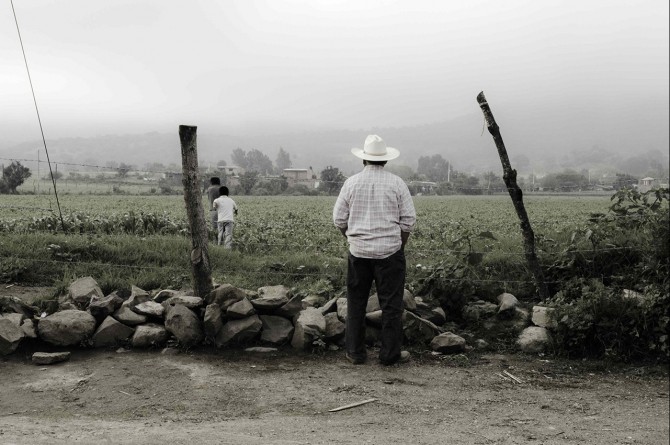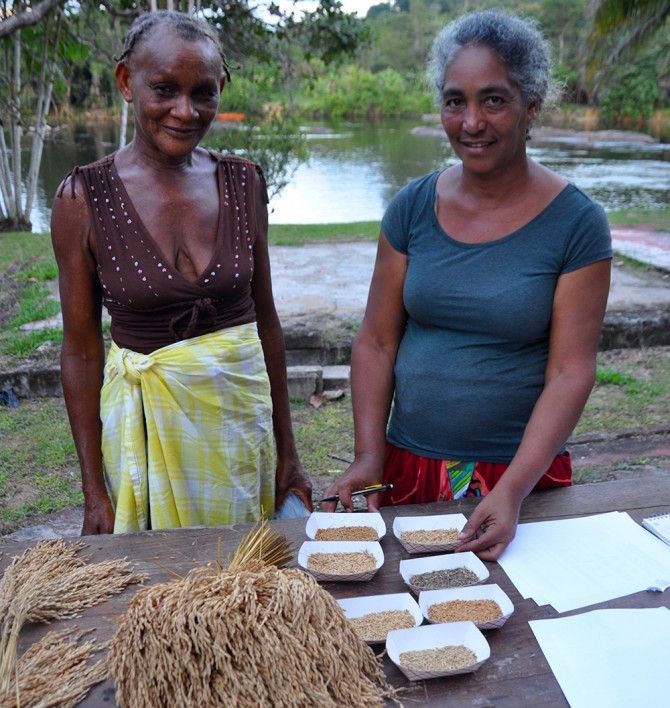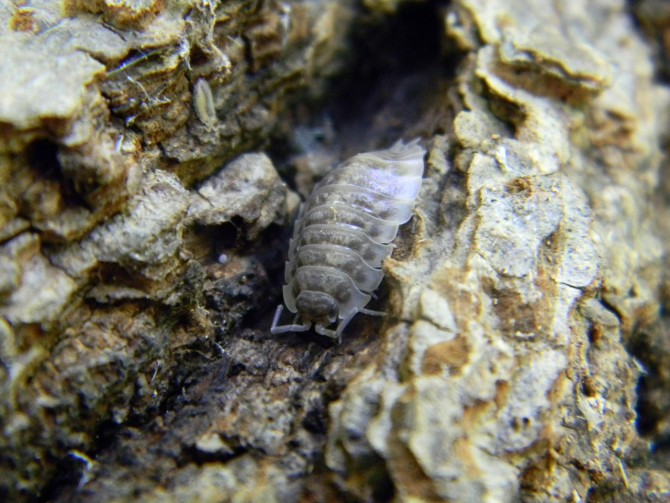
Livestock herders are pictured in Burgut Conservancy, Alichur, in eastern Tajikistan.
Atkinson's Academic Venture Fund awards $1.5M to 12 projects
By David Nutt
The Atkinson Center for a Sustainable Future’s Academic Venture Fund (AVF) supports collaborations that cut across disciplines to address today’s greatest sustainability challenges. In 2018, the fund awarded $1.5 million to a range of projects that will provide sustainable solutions around the world, from the Finger Lakes to the Pamir Mountains in Central Asia.
Among the 12 projects are efforts aimed at transforming nutrient-rich poultry waste into economically viable fertilizers; developing in-situ conservation strategies for African rice; boosting nature-based engagement for elementary schools in low-income communities; and connecting rural and urban areas across New York state through a public “Internet of Things” infrastructure.
Three projects are co-sponsored by Cornell’s Master of Public Health program, an interdisciplinary degree that grew out of the Atkinson Center in fall 2017. The Atkinson Center is also partnering with the Office of Engagement Initiatives (OEI) in support of Engaged Cornell, which provides $10,000 grants for AVF projects that incorporate undergraduate research opportunities and community engagement.
The 2018 funded projects:
Using Data to Boost Drought Resilience in the Caribbean: From 2013 to 2016, the Caribbean region endured its worst drought in over half a century. To help farmers in the Dominican Republic cope with the changing climate, researchers will design and deploy low-cost soil moisture and plant stress-monitoring sensors that transmit information to a cloud-based computing platform. This technology will enable improved near-term forecasts of drought conditions, alerting farmers to drought hazards by text message. Researchers will conduct surveys to understand the barriers to weather and climate data, and assess the efficacy of the new tools.
Investigators: Toby Ault, earth and atmospheric sciences; Abraham Stroock, chemical and biomolecular engineering; Shorna Allred, natural resources.
Stay or Go? How Environment Affects Migration in Mexico: Studies have examined how economic, political and social factors affect migration in Mexico, but the role of the environment has not been explored. This project links environmental events to individuals’ decisions to migrate from rural to urban areas in Mexico, and from Mexico to the United States. Researchers will combine novel environmental measures and in-depth interviews with the largest existing survey on Mexican migration that captures more than 150,000 individuals’ movements from 1965 to 2017. The goal is to identify behaviors and structures that shape adaptation responses and to design policies that foster resilience in collaboration with local organizations. Received Engaged Cornell supplemental grant.
Investigators: Filiz Garip, sociology; Allison Chatrchyan, earth and atmospheric sciences; Nancy Chau, Cornell SC Johnson College of Business, Dyson; Ariel Ortiz Bobea, Cornell SC Johnson College of Business, Dyson; Amanda Rodewald, Laboratory of Ornithology.
Doing More with Less Livestock: The Pamir Mountains of Tajikistan support a fragile ecosystem of limited resources that is increasingly at risk due to unsustainable numbers of livestock. Wild ungulates, in particular, are threatened by grazing competition and disease, which also impact the endangered snow leopards that hunt them. This project aims to develop a self-sustaining veterinary support system that will help Pamiri communities achieve the same or greater productivity from maintaining smaller, healthier livestock herds, with a reduced environmental footprint.
Investigators: Martin Gilbert, population medicine and diagnostic sciences; Edward Mabaya, Cornell SC Johnson College of Business, Dyson.
The Role of Nitrogen in Toxic Blooms in the Finger Lakes: Toxic cyanobacteria blooms are increasing globally. Since 2015, several Finger Lakes have experienced blooms for the first time, threatening lake health and sustainable use for drinking water and recreation. These blooms were unexpected because stringent phosphorus standards were established years ago to protect water quality in some of the lakes. Researchers aim to confirm a new ecological theory that suggests high nitrogen inputs – spurred by a changing climate – may be the cause, a finding that could lead to new watershed management strategies and an added emphasis on the relationship with climate variability. Co-sponsored by MPH.
Investigators:Robert Howarth, ecology and evolutionary biology; Todd Walter, biology and environmental engineering; Roxanne Marino, ecology and evolutionary biology.
Opening the Door to Nature-Based Engagement: Young people today show greater rates of stress and anxiety, a trend that coincides with a growing recognition of the threats to the natural environment. Employing a One Health approach, researchers will examine how curricular programing that provides students more time in nature can lead to healthier populations and environments. The project will specifically focus on elementary schools serving low-income communities in urban and rural areas, and will identify curricular best practices and generate data to inform programs and state policy for long-term social and environmental impact. The project also received a Engaged Cornell supplemental grant. Co-sponsored by MPH.
Investigators: Gen Meredith, population medicine and diagnostic sciences; Don Rakow, horticulture; Nancy Wells, design and environmental analysis; Janis Whitlock, Bronfenbrenner Center for Translational Research; Monika Safford, Weill Cornell Medicine; Samantha Hillson, Tompkins County Health Department.
The Future of Fibers May Be Local: Small flock fiber farmers struggle to survive in a global economy that favors standardization and commoditization of a narrow set of breeds and genetic stock to produce cheap material that must compete with synthetic, low-cost competitors. However, as interest in locally produced goods grows, small flock fiber farms may have an opportunity to thrive by influencing development of specialized textile markets. This project seeks to evaluate small flock-based fiber market value chains and connect rural and urban fiber-textile economies, growing rural economies and helping similar markets do the same. The project received Engaged Cornell supplemental grant.
Investigators: Mark Milstein, Cornell SC Johnson College of Business, Johnson; Miguel Gomez, Cornell SC Johnson College of Business, Dyson; Tasha Lewis, fiber science and apparel design; Anu Rangarajan, horticulture; Michael Thonney, animal science.
Sustainable Intensification and Conservation of African Rice: Three hundred years ago, the Saramaka people in Suriname escaped from plantation slavery to the rainforest interior of the country and lived in relative independence by hunting, gathering and growing African rice (Oryza glaberrima). But with increased population, rice self-sufficiency can no longer be guaranteed, and Saramaka leaders seek new sustainable solutions to increase rice productivity and protect its biodiversity. Researchers will work with farmers to characterize rice diversity and improve agronomic practices. They will also use genetic analysis to identify the origins of the Saramaka rice and assist communities in developing in-situ conservation strategies. Received a $5,000 Engaged Cornell supplemental grant.
Investigators: Erika Styger, International Programs in the College of Agriculture and Life Sciences; Susan McCouch, plant breeding and genetics; Chelsea Specht, plant biology.
Sounds of Soil: Root-feeding insects reduce belowground plant productivity and disrupt soil carbon cycling, ultimately eroding plant and soil health. Current methods for monitoring these insects are time-consuming, cost-prohibitive and often unreliable. Researchers will develop inexpensive acoustic sensors to detect, monitor and characterize populations of soil-dwelling organisms, distinguishing them from other complex sources of acoustic signals belowground, while also assessing overall soil health. The result will be a reliable method for pest monitoring that is accessible and profitable to farmers, leading to more judicious pesticide use and enhanced agricultural sustainability and food security.
Investigators: Kyle Wickings, entomology; Johannes Lehmann, soil and crop sciences; Holger Klinck, Laboratory of Ornithology; Greg McLaskey, civil and environmental engineering.
Making Farm-to-Fork Food Safety More Sustainable: Food safety decisions are typically made without taking conservation into account. This project models the trade-offs between food safety and conservation aims associated with specific food safety practices. Specifically, the project examinesthe impacts of pre-harvest food safety practices for preventing wildlife from entering fields on surface water quality.The project will provide growers with a conceptual framework that they can use to develop farm management plans that minimize economic and environmental costs, while optimizing food safety outcomes, ultimately improving on-farm food safety and sustainability as well as the economic resiliency of farm communities. Co-sponsored by MPH.
Investigators: Martin Wiedmann, food science; Aaron Adalja, Cornell SC Johnson College of Business, SHA.
Waste No More: Creating Aquaculture Feed from Seafood Industry Byproducts: World demand for seafood is rising as wild fish stocks decline, creating an urgent need for new sources of protein to grow fish. This project aims to develop a novel system for making sustainable aquaculture feed from commercial fish processing waste, whereby liquefied, acid-preserved fish protein – or fish silage – is transformed into mass quantities of pellets for farm use. By salvaging high-quality proteins to replace controversial fishmeal in aquafeeds, the silage-based feed system will make aquaculture more sustainable and economically viable while reducing pressure on wild fish stocks.
Investigators: Eugene Won, animal science; Joe Regenstein, food science; Helene Marquis, microbiology and immunology.
Recycling Poultry Litter for Fertile Fields: As the world’s largest producer of poultry meat, the U.S. generates approximately 55 million dry tons of poultry litter ever year, resulting in expensive disposal costs and a large environmental footprint. This project seeks to achieve long-term food security by transforming nutrient-rich poultry waste into economically viable fertilizers. The team will couple innovative technology development with energy-environmental-economic systems analysis. The researchers’ partnerships with key stakeholders in the poultry industry and support from the U.S. Environmental Protection Agency will maximize the impacts of the project. Received Engaged Cornell supplemental grant.
Investigators: Fengqi You, chemical and biomolecular engineering; Johannes Lehmann, soil and crop sciences; Xingen Lei, animal science; Jefferson Tester, chemical and biomolecular engineering.
Bridging the NYS Rural and Urban Divide through a Public ‘Internet of Things’: Rural areas have been plagued by poor cellular connections and a lack of investment by wireless telecommunication companies. This project aims to use affordable Low Power Wide Area Network (LPWAN) technology to create a testbed in Tompkins County with 100 percent coverage and through 30 Cornell Cooperative Extension offices across New York state that will be equipped with LPWAN-based electricity and water metering. This statewide, public “Internet of Things” infrastructure will bridge the digital divide between rural and urban areas, spur new economic activities, and be a game-changer for sustainability. Received Engaged Cornell supplemental grant.
Investigators: K. Max Zhang, mechanical and aerospace engineering; Stephen Wicker, electrical and computer engineering; Kenneth Schlather, Cornell Cooperative Extension of Tompkins County; David Kay, development sociology.
David Nutt is managing editor of the Atkinson Center
Media Contact
Get Cornell news delivered right to your inbox.
Subscribe



